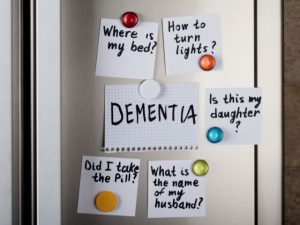Different Types of Dementia
Alzheimer’s Disease
Studies have shown that 60-80% of people with dementia have this type of disease.
The individual presents with symptoms such as memory loss and difficulty planning and performing routine tasks.
The symptoms are mild at first but progressively worsen. Other symptoms noted may be confusion about person, place, and time, difficulty speaking and/or writing, losing things, poor judgment, and mood and personality changes.
Vascular Dementia
Individuals with this type of dementia typically have had a stroke and symptoms depend on which part of the brain is affected by the stroke. The first signs noted with vascular dementia is typically poor judgment or difficulty planning, organizing, and making decisions.
Other noted symptoms are memory problems that disrupt the individual’s daily life, difficulty speaking and understanding speech, difficulty recognizing sights and sounds that used to be familiar, becoming confused or agitated easily, changes noted in mood and personality, and difficulty walking and having increased falls.
Dementia with Lewy Bodies (DLB)
Lewy bodies consist of tiny microscopic deposits of a protein that form in some individual’s brains. The deposits of the protein develop and form in the part of the brain called the cortex and the symptoms include difficulty thinking clearly, making decisions, or paying attention.
The individual also has problems with memory, experiencing hallucinations, unusual sleepiness during the day, periods of “blanking out” or staring, difficulty with movement including slowness, and trouble walking, and the individual may have dreams where he/she acts out physically and may include walking, talking, and kicking.
Parkinson’s Disease Dementia
Studies have shown that individuals with nervous system disorders experience this type of dementia at an estimated 50-80% of the time.
Typically, the symptoms of dementia develop approximately ten years after a person is first diagnosed with Parkinson’s. Individuals with Parkinson’s Disease have the same symptoms as dementia with Lewy Bodies and both conditions exemplify signs of Lewy bodies in his/her brains.
Frontotemporal Dementia (FTD)
Individuals with this type of dementia have developed cell damage in areas of the brain that control judgement, planning, emotions, movement, and speech.
These individuals may also experience behavior and personality changes, sudden lack of inhibition in social and personal situations, problems thinking of the correct words when speaking, and movement problems such as shakiness, muscle spasms, and balance problems.









